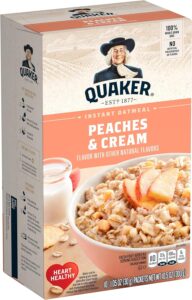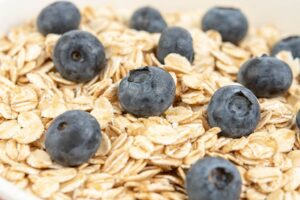Oatmeal has stood the test of time as a staple breakfast food in many cultures around the world. Whether you like it creamy, hearty, sweetened with fruits, or topped with nuts, there’s no denying oatmeal’s versatility—and that’s just one reason to love it. Beyond its comforting warmth and adaptability to various toppings, oatmeal offers an impressive array of health benefits that make it well worth your while to eat it regularly. Below, we’ll explore eight powerful benefits of adding oatmeal to your daily diet.

1. A Nutrient-Dense Start to Your Day
When it comes to starting your day off right, nutrient density matters. Oatmeal, made from whole oat grains, is naturally packed with essential vitamins and minerals. It boasts a particularly high concentration of B vitamins, which support energy production, and important minerals like manganese, phosphorus, and magnesium. These nutrients help maintain numerous bodily functions, from bone health to nerve function.
A bowl of oatmeal also contains a significant amount of protein relative to other grains. Protein is essential for muscle repair, immune health, and metabolic processes. By choosing oatmeal instead of heavily processed breakfast cereals, you’re automatically upgrading your morning meal to one that fuels your body with beneficial vitamins, minerals, and macronutrients—without the excessive sugar that often lurks in commercial cereals.
2. High in Soluble Fiber for Heart Health
One of the prime reasons that oatmeal is touted as a health food is its rich soluble fiber content, particularly a type called beta-glucan. Soluble fiber dissolves in water to form a gel-like substance in your digestive tract. This process helps trap cholesterol-rich bile acids, reducing the total amount of cholesterol absorbed into your bloodstream.
Research has shown that consuming oatmeal regularly can help lower LDL (“bad”) cholesterol levels, potentially leading to a reduced risk of heart disease. Beta-glucan not only aids in cholesterol management but also supports overall cardiovascular health. When combined with a balanced diet that includes plenty of fruits, vegetables, and lean proteins, oatmeal can be a key component in your strategy for keeping your heart strong and healthy.
3. Helps Stabilize Blood Sugar Levels
Daily oatmeal consumption can be beneficial for maintaining steady blood sugar levels. Thanks to its soluble fiber and complex carbohydrates, oatmeal digests more slowly than refined grains like white bread or sugary cereals. This slow release of glucose into the bloodstream helps to prevent sharp spikes in blood sugar, followed by subsequent crashes that can leave you feeling drained and hungry.
For individuals who have type 2 diabetes or prediabetes, or those simply trying to watch their sugar intake, oatmeal’s effect on blood glucose can be especially advantageous. Pair your oatmeal with protein-rich toppings—like nuts, seeds, or Greek yogurt—to extend the blood sugar-stabilizing effect even further.
4. Supports Weight Management
If you’re looking to maintain or reach a healthy weight, oatmeal might become your new best friend. The fiber content in oatmeal helps increase feelings of fullness or satiety, which means you’re less likely to find yourself mindlessly snacking later in the morning. A nourishing breakfast of oatmeal with fruit and a sprinkle of nuts or seeds can help keep your hunger at bay and support healthier eating patterns throughout the day.
Additionally, oatmeal is naturally low in fat and free of added sugar (unless you sweeten it yourself). By choosing toppings wisely—such as fresh berries, bananas, or a teaspoon of honey—you can keep your oatmeal both delicious and diet-friendly. This combination of high-fiber content and controlled calorie intake works together to keep you feeling satisfied while helping you maintain steady progress on your weight goals.
5. Beneficial for Digestion
Healthy digestion hinges on getting enough dietary fiber, and oatmeal can provide an appreciable amount of it. The soluble fiber in oatmeal adds bulk to your stool and facilitates smoother passage through the digestive tract, which can aid in preventing constipation. Furthermore, regular consumption of fiber-rich foods like oatmeal supports a diverse and balanced gut microbiome—crucial for overall health, immune function, and even mood regulation.
This supportive digestive effect might also reduce the risk of developing certain gastrointestinal disorders. By integrating a simple bowl of oatmeal into your daily routine, you’re not only getting a tasty meal but also nurturing the complex ecosystem in your gut.
6. Boosts Energy and Stamina
Between busy work schedules, family commitments, and personal goals, most of us require sustained energy to tackle our daily tasks. Oatmeal can help deliver that steady stream of energy. Complex carbohydrates like those found in oats are broken down gradually, providing a more consistent fuel source than quick-digesting simple sugars.
Additionally, oatmeal contains protein, which contributes further to long-lasting energy. This combination helps you power through morning meetings, workouts, or errands without the mid-day slump you might experience after eating a high-sugar, low-fiber breakfast. As a result, you can stay focused, productive, and energized throughout the day.
7. Versatile and Easy to Prepare
Health benefits often get the spotlight, but it’s important not to overlook oatmeal’s sheer practicality. For one, it’s easy to prepare; you can make oatmeal on the stove, in the microwave, or even overnight in the refrigerator. This flexibility means that even on the busiest mornings, you can whip up a quick, nutritious meal.
Furthermore, oatmeal can easily fit into various dietary preferences. Whether you’re vegan, vegetarian, or just trying to eat more whole foods, oatmeal aligns beautifully with many eating styles. By customizing toppings—think fresh fruit, nut butter, seeds, or a drizzle of maple syrup—you can keep your breakfasts exciting and varied all week long.
8. May Contribute to Healthy Skin
One lesser-known benefit of oatmeal is its potential to improve skin health. Oatmeal has been used topically for centuries to soothe irritation and dryness. In fact, colloidal oatmeal is a common ingredient in skincare products, especially those targeting eczema or sensitive skin. While direct application is effective, ingesting oatmeal on a daily basis provides you with nutrients like zinc, vitamin B, and antioxidants that can benefit your skin from the inside out.
By consuming foods that support skin health, you can help tackle issues like dryness, redness, and even acne more holistically. Of course, oatmeal alone is not a magical cure for skin problems, but it can form a part of a comprehensive lifestyle plan that includes a balanced diet, proper hydration, and mindful skincare.
Tips for Maximizing Oatmeal’s Health Benefits
- Choose Whole Oats: Opt for rolled oats, steel-cut oats, or old-fashioned oats instead of instant varieties. Instant oat packets often come loaded with added sugars and sodium. Whole oats provide the most nutrients and best health benefits.
- Add Protein: Balance out the carbohydrate content by topping your oatmeal with protein-packed foods like Greek yogurt, cottage cheese, seeds, or a sprinkle of protein powder.
- Go Easy on Sweeteners: While it’s fine to add a touch of sweetness, be mindful of how much sugar or honey you add. Consider using mashed bananas or applesauce for a natural sweetening effect.
- Incorporate Healthy Fats: A few tablespoons of nuts, seeds, or nut butter can provide healthy monounsaturated and polyunsaturated fats, offering additional energy and nutrients.
- Spice It Up: Flavorings like cinnamon, nutmeg, or vanilla extract can elevate your oatmeal’s taste without piling on sugar. These spices also bring along their own sets of antioxidants and anti-inflammatory properties.
Conclusion
A daily bowl of oatmeal is more than just a simple breakfast choice; it’s a potent tool for fostering overall well-being. From promoting heart health and stabilizing blood sugar to improving digestion and supporting weight management, oatmeal’s range of benefits is extensive and science-backed. Its high soluble fiber content, abundant nutrients, and versatility make it a meal that can easily align with your health goals—whether you’re trying to manage cholesterol, boost energy, or simply eat more whole foods.

Ultimately, the key lies in how you prepare it. Choose high-quality oats, pair them with nutrient-dense toppings, and watch as your mornings become both delicious and health-focused. With benefits stretching from your cardiovascular system to your digestive tract and even to your skin, oatmeal has earned its reputation as a daily dietary powerhouse. So grab a spoon, get creative with your toppings, and enjoy the many perks of this tried-and-true superfood.
